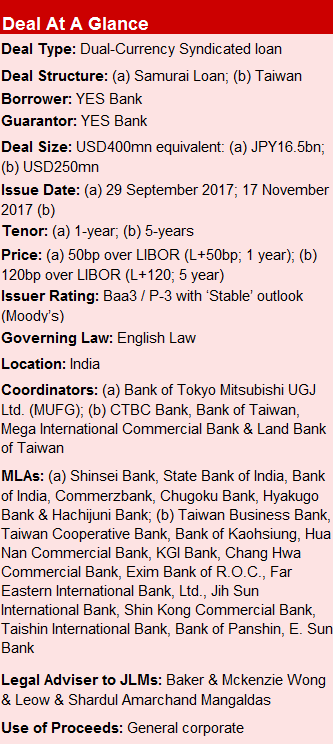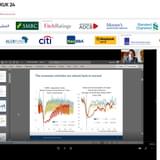
Background: In autumn 2017 YES Bank, whose overall foreign asset book had reached USD1.4bn by September, was looking to raise hard currency capital in order to on-lend the funds through its international branch at GIFT City, Ahmedabad.
Although generally benchmark deal size tends to be USD500mn, the fact that YES’s planned loans were country-specific meant that it was able to go for a lower size – as it did in 2014, when it successfully raised USD422mn from 21 lenders.
In September and November, India’s fifth largest private sector bank went on to raise USD400mn through two syndicated loan transactions – its second in Taiwan (USD250mn) and a first in Japan (JPY16.5bn), reinforcing the bank’s ability to tap varied resource pools at competitive prices and leverage newer geographies to fund the bank’s expansion.
Transaction Breakdown
In September 2017, YES Bank embarked on a strategy to whet the appetite for its debt amongst local banks/FIs for a primary interest and to widen level of bank participation, looking to make its maiden foray into the Samurai market – a market not generally tapped by Indian borrowers – and its second in Taiwan.
It encountered some challenges initially, as some of the prospective lenders in the Samurai loan raised concerns on the pricing, as most were considering a non-state backed Indian credit for the first time. Also, in the broader market context, there have not been any loans with 5-year+ tenor from Indian issuers in the commercial loan market.
Despite these obstacles, YES went ahead with a dual-currency syndication, retaining 3x oversubscription on the USD150mn Samurai loan and upsizing the Taiwanese tranche from USD200mn to USD250mn amid an overall subscription of USD355mn.
The bank managed to achieve pricing on the Samurai loan almost at par with offshore dollars due to favourable swap rates. In the Taiwan loan, it was able to tighten the pricing compared to last year on the back of a successful maiden transaction, which invited higher interest this year.
It was a maiden Samurai loan transaction for YES Bank, as well as a successful second transaction in the Taiwanese market, allowing it to bring in 13 banks apart from the 4 mandated lead arrangers – amongst the largest bank participation in the Taiwanese loan market.
By tapping the JPY and Taiwanese loan market, YES Bank has been able to extend its FX resource base beyond the traditional sources of financing; it also allowed the lender to draw in a range of Japanese and Taiwanese banks that typically only work with large and/or state-owned banks.









